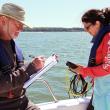Coastal Rivers seeks community science volunteers
Coastal Rivers is seeking volunteers for three on-going community science initiatives focused on water quality, plus one new program collecting data on rockweed. Coastal Rivers provides technical training for all community science programs, which offer the chance to get outside, on or near the water, and be part of data-gathering efforts to inform the broader community about the health of local waters and other natural resources.
Rockweed Monitoring: Training for this program will take place on Wednesday, May 17 from 2 to 5 p.m. at Plummer Point Preserve in South Bristol. Coastal Rivers is joining Project ASCO, a citizen science initiative designed to get interested participants into the intertidal zone to collect data on the seaweed known as rockweed, Ascophyllum nodosum (“Asco”).
Rockweed is the dominant species in most of the rocky intertidal zone of Maine and provides important habitat for other intertidal organisms. Rockweed is also harvested for commercial use in Maine, and sustainable management requires knowledge of the total amount of rockweed throughout the state.
Participants in this training session will learn to collect data on rockweed in the rocky intertidal zone to help answer the question, “How much rockweed is there?” Scientists at Schoodic Institute will analyze and share collected data to help inform resource management.
For more information or to register for this training, visit https://schoodicinstitute.org/science/marine-ecology-research/latest-projects/project-asco-assessing-seaweed-via-community-observations/ or email projectasco@schoodicinstitute.org.
Swim Beach Monitoring: A training session for the Maine Healthy Beaches program is scheduled for Thursday, May 18, from 2 to 4 p.m. at Pemaquid Beach Park. Coastal Rivers volunteers take samples at the Pemaquid Beach, Biscay Pond, and Bristol Mills swim areas to monitor for bacterial contamination.
Throughout the summer, the data help determine risk levels to swimmers based on levels of bacterial contamination and cyanobacteria. Volunteers conduct the monitoring early every Tuesday morning, June through August. A state-certified water quality lab in Rockland performs the analysis. Bigelow Laboratories will also be assisting with cyanobacteria monitoring.
Registration for the Swim Beach Monitoring is required and can be done online at coastalrivers.org/event/swim-beach-monitoring-2023.
Lake and Pond Monitoring: Training for this program will take place on Wednesday, May 24 from 2 to 4 p.m. at Coastal Rivers’ Denny Conservation and Education Center at Round Top Farm in Damariscotta.
Coastal Rivers works closely with Lake Stewards of Maine to gather data from our local freshwater bodies, including Webber, Biscay, and Pemaquid Ponds. Data are used to observe environmental changes over time and provide information about how activities on land affects water quality in the sensitive lakes and ponds.
Volunteers conduct water quality monitoring in lakes and ponds throughout the summer by paddle craft or small boat, beginning in early June.
Registration for the Lake and Pond Monitoring training is required and can be done online at coastalrivers.org/event/lake-pond-monitoring-2023.
Coastal Rivers is a non-profit, member-supported, nationally accredited land trust caring for the lands and waters of the Damariscotta-Pemaquid Region by conserving special places, protecting water quality, creating trails and public access, and deepening connections to nature through education programs. For more information, email info@coastalrivers.org or visit coastalrivers.org.


























